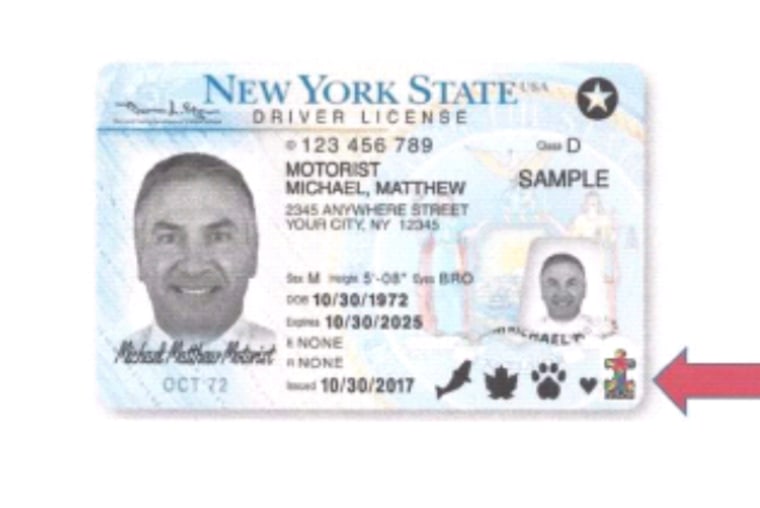Like many parents of teens who’ve just started driving, Peter Gagliardo worries about what his son Ryan might encounter on the road. But there’s extra anxiety because Ryan is on the autism spectrum.
The 18-year-old has never had a traffic stop since getting his driver’s license six months ago, but if it were to happen, Gagliardo wonders how police officers would treat him if he behaved differently than they expected.
“My worry is that he would shut down, not really understand why he’s getting pulled over,” Gagliardo, 52, of Brewster, New York, told TODAY.
“Then when somebody walks up to the car — if it’s two officers, one on each side — I think he would get nervous and maybe just put his hands on the wheel and not say anything, which then would cause the officer to get nervous, which is understandable.”
So Gagliardo is urging lawmakers in New York to allow people with autism the option to include a special symbol on their driver’s license and state ID card indicating they have the disorder.

This fall, he sent 20 letters to local and state officials explaining how the step would allow police officers to know right away they might be dealing with someone who has difficulty communicating or processing verbal commands. This could reduce the risk of misunderstandings, so that interactions between police and people with autism don't escalate into conflict.
New York Gov. Andrew Cuomo responded that he’d look into the idea, Gagliardo said. A member of the New York State Assembly drafted a bill to try to make it happen.
“It’s just a better awareness situation,” Gagliardo said. He hopes the bill will come up for a vote when lawmakers are back in session in January.
Other states start offering the option
One in three teens who have autism without intellectual disability earn a driver’s license, a 2017 study found.
If pulled over, they might need extra processing time, avoid eye contact or become anxious, which could give the impression of guilt or an unwillingness to cooperate, said Wendy Fournier, president of the National Autism Association.
“From a safety perspective, it could be beneficial for police officers to know prior to approaching a vehicle that the driver may have difficulty communicating or being able to immediately comply with verbal instructions,” Fournier noted.
A few states already allow people to note the disorder on their IDs or licenses.
In Texas, drivers have the option to add a “communication impediment” note on their driver’s license or to their DMV file. The law covers people with autism, Asperger syndrome, hearing impairment, PTSD and other conditions. If they’re pulled over, officers will know about their condition before they approach the car, NBC affiliate KXAN reported.
Arkansas also allows people with autism to apply for a communication impediment designation on their driver’s license, ID card or a decal on their license plates. Georgia allows autism and other medical conditions to be listed on the back of a driver's license or ID card. Virginia and the District of Columbia provide the option to include a code on the documents indicating the holder has autism spectrum disorder.
Michigan is considering a similar option.
Gagliardo envisions the New York bill would work in a similar way the other laws work, but would be limited to adding the symbol to the driver's license. People with autism who wish to have the information added to their driver’s license would need to have their condition certified by a doctor.
Applying for the special symbol would be optional, not mandatory, for adults. When it comes to teen drivers, the decision would be up to their parents, Gagliardo noted. When the teens become adults, they could remove the symbol from their IDs if they wished. Gagliardo said he has received thousands of messages of support for the bill from all over the country.
Not everyone is a fan
But there are critics who worry about privacy, noting such an option might create a government list of who has autism.
Gagliardo countered that applying for the special driver's license designation would be completely voluntary. He believes the government already has access to medical records, though federal law protects the privacy of medical information.
Autism advocacy groups in New York said the option needs to be rolled out very carefully and with plenty of input from people on the spectrum and their parents.
National groups were also cautious. Fournier, of the National Autism Association, suggested that there be nothing visible on the driver’s license.
“Disclosure is a personal choice,” added Thomas W. Frazier, chief science officer for Autism Speaks.
“However, speaking more broadly than driver’s licenses," he added, "we do encourage people with autism and their families to make sure information about their autism diagnosis, any medical conditions and emergency contacts is readily available to first responders."
In some cases, wearable identification is recommended for safety, Frazier said: "What’s important, from our perspective, is that the person on the spectrum do what’s right for them.”

